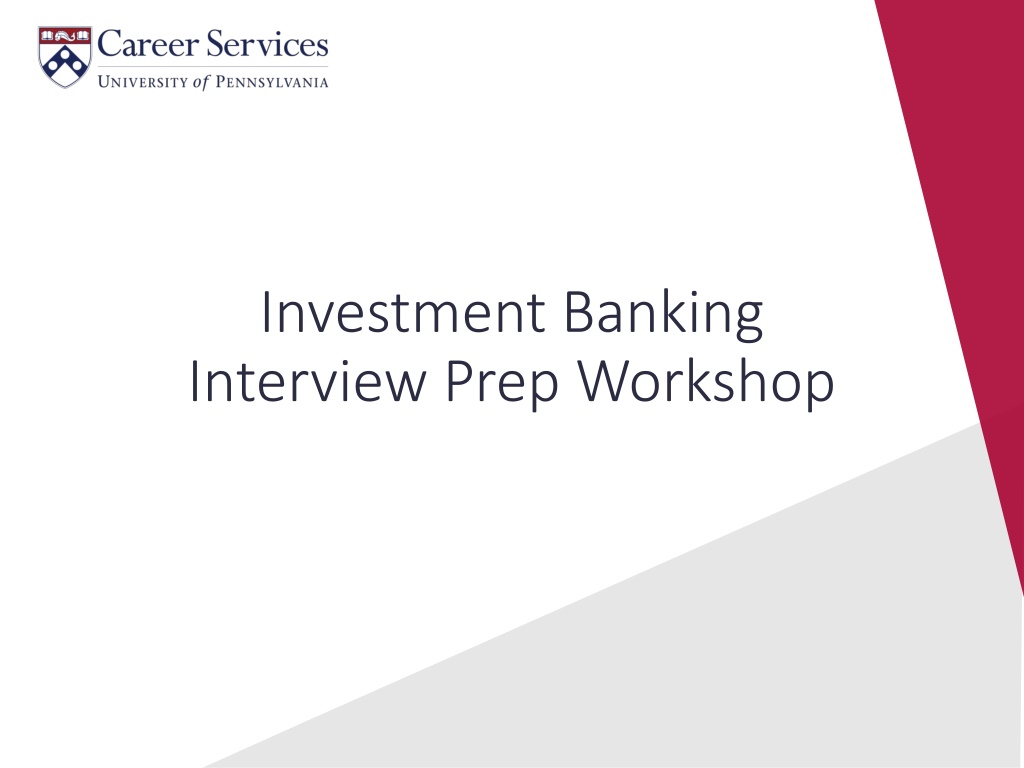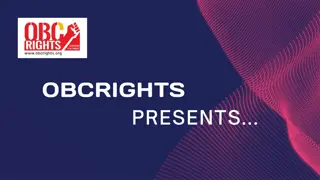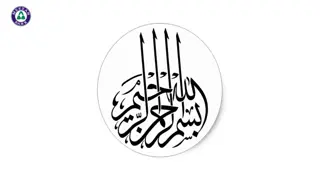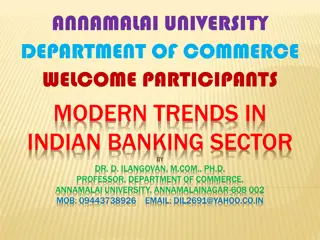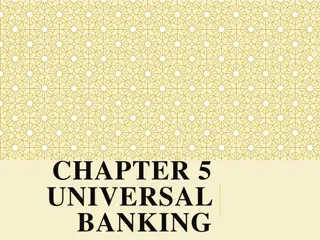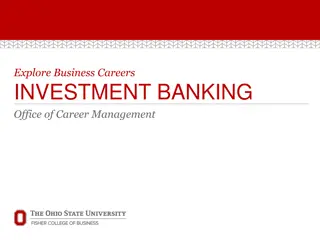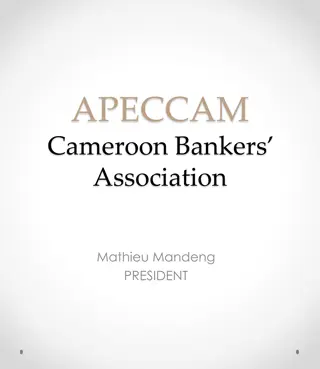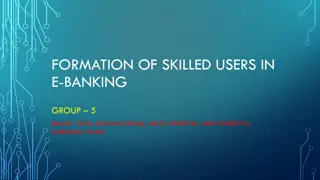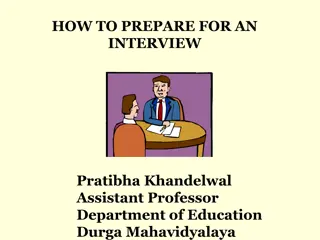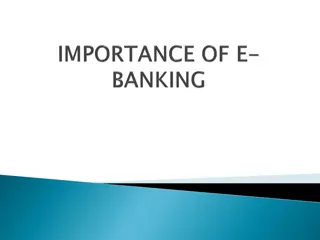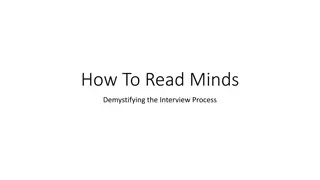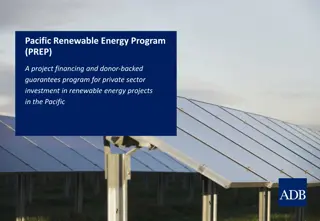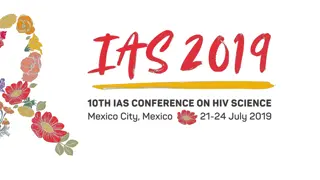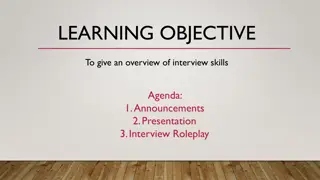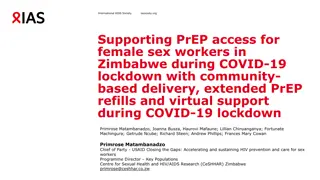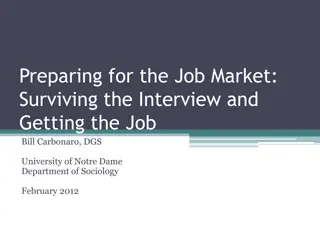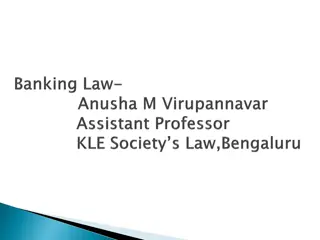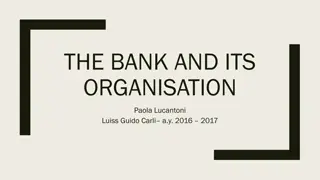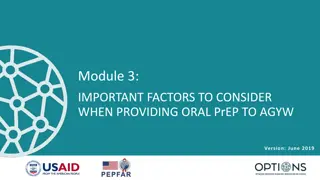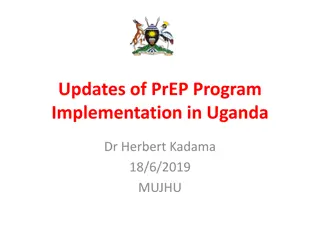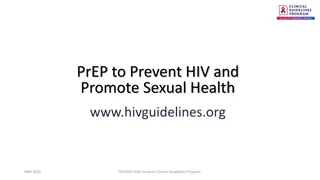Investment Banking Interview Prep Workshop
Uncover the secrets to acing interviews in the investment banking field through effective networking, valuable career advice, and strategies for landing job opportunities. Discover how to make the most of informational interviews and leverage recommendations to stand out. Learn why networking is crucial for obtaining job offers in this competitive industry.
Uploaded on Feb 17, 2025 | 0 Views
Download Presentation

Please find below an Image/Link to download the presentation.
The content on the website is provided AS IS for your information and personal use only. It may not be sold, licensed, or shared on other websites without obtaining consent from the author.If you encounter any issues during the download, it is possible that the publisher has removed the file from their server.
You are allowed to download the files provided on this website for personal or commercial use, subject to the condition that they are used lawfully. All files are the property of their respective owners.
The content on the website is provided AS IS for your information and personal use only. It may not be sold, licensed, or shared on other websites without obtaining consent from the author.
E N D
Presentation Transcript
Investment Banking Interview Prep Workshop
Presentation Topics: How to land the interview Format and strategies to ace the interview Other resources 2
Networking is extremely important for sourcing job opportunities, getting interviews, and converting offers Benefits Description Example Informational interviews with current professionals offer ability to learn about an industry, company, or role Speaking with investment bankers may help a person feel confident that it is the right career choice for them Learning / information Commonly cited benefits of networking Career advice can help you pursue the best opportunities, make the best decisions, and avoid pitfalls in your job search Receive potential guidance such as pursuing an MBA, which may be helpful for some individuals considering a future career move Advice Many job opportunities are filled before a formal posting is ever created networking allows you to be top of mind for openings Can lead to a job offer when there is no posting - employer may create a posting (collecting hundreds of resumes), then close it without interviewing anyone Sourcing job opportunities benefits of networking Name recognition is crucial for a resume to be chosen from many qualified candidates Recommendations can overcome other resume flaws (GPA, test scores, experience) Can lead to interviews at the firms where you network the most not firms you did not network with, even with the same resume Underappreciated Getting interviews Ability to use personal experience and stories when experiencing Why this company? questions is crucial Knowledge of industry from networking Ability to talk personally about culture and the people you know can be crucial for interview success Converting offers 3
There shouldnt be any excuses to not network! Excuse Solution Be strategic in your approach (smaller company list) Spend less time on lower value-add activities (resume reviews) Networking is often THE most important factor in getting your dream job it s worth the effort! It s too much work and time People like to help others Everyone gets help throughout their careers pay it forward mentality Asking for help is an imposition, I don t want to bother people Networking is manipulative Be authentic and communicate your agenda clearly Find a way to network that works with natural preferences (phone vs. in-person, smaller group settings, etc.) Only extroverts can network effectively 4
Your goals during networking should be to recruit advocacy during one-on-one meetings Recruit advocacy by being genuine, listening well and not pitching too aggressively One-on-one meetings work better for networking than group settings You will be more memorable in one-on-one meetings are more memorable Personal advocates are more likely to help you in your career search find opportunities, send recommendations, etc. Being likable in networking conversations is crucial Listen more than you speak Have a conversation! If you have fun, it s more likely the other person is as well o Can show your personality (more difficult in group settings) Recruit advocacy o People can t help you if they don t remember you! Information sessions, career fairs, and other similar settings, while helpful, are not enough networking for this exact reason they aren t one-on-one and you aren t likely to be remembered o Representatives at firm information sessions may remember very few names / backgrounds Selling yourself is not the goal of networking Pitches can come across as aggressive and non-genuine Fewer people will like you if you pitch aggressively Don t pitch aggressively o Individuals that reach out to representatives after the session are more memorable 5
Focus of the presentation is on the tactics of successful networking, and less on the overarching principles Develop list of target companies based on desired industry, location, culture, role, etc. Important step for job search but not focus of networking presentation Create target company list Create contact list of employees at each target company Utilize friends and family, Penn alumni database, and other online sources to create full list Find contacts Email to request informational interview with contacts with goal of learning more about the company / industry Ask for meeting / conversation Focus of this presentation Hold initial informational interview with individuals to get to know them and learn more about their company Can assess cultural fit and hiring needs Have meeting / conversation Maintain contact with connections throughout job search Potential to ask for interview or recommendation, depending on quality of connection Follow-up Utilize information sessions (EISs), coffee chats, career fairs and other Penn resources to develop contacts for networking conversations Other tactics 6
Find contacts Ask for meeting Have meeting Other tactics Follow up There are several different resources for finding contacts, but you should prioritize who to reach out to You should use all available resources to create a contact list and you should prioritize your contacts based on relevance and likelihood of response Utilize any connections from people you know (upperclassmen, recent graduates, family) Employees currently working at your target company are better than former employees (but both are helpful!) Try to find contacts on the exact team your targeting If not available, look at adjacent teams (e.g., corporate strategy for M&A) Friends and family Company myPenn offers advanced search features to sort by industry, company, location and other criteria Penn alumni database Functionally relevant LinkedIn also offers advanced search features, and it can highlight friends of friends for potential warm intros Penn alumni are more likely to respond and be willing to help than non-alumni LinkedIn Alumni Some senior leaders will be listed on a company website or articles Contacts sourced here will tend to be more senior Junior employees make great entry points for networking, and are lower stress conversations Senior employees have more say! Company websites and articles 1-2 levels above you 7
Find contacts Ask for meeting Have meeting Other tactics Follow up Ask for a meeting or conversation through a short, direct email Your email should have several similar components to the sample Sample email structure People won t read long emails! Keep to ~100-150 words Hi John, Short My name is Eddie Roberts, and I m a sophomore at Penn studying Economics. After interning in private wealth management this past summer, I am interested in exploring investment banking. State who you are and what you re interested in Introduction After seeing your profile on LinkedIn, I was hoping you would be willing to schedule a short, 15-20 minute phone call with me. I would love to learn more about your background in middle market investment banking, especially how you transitioned from private wealth management. I would also appreciate any advice you would be willing to give. Let the person know where you found their information How you found them Ask for advice / insight, not job assistance via a phone call or coffee chat Direct ask I am relatively free in the afternoons on weekdays, but let me know a time that works for you and we can set something up. Look forward to chatting. Tell them what you want to talk about and why it will be helpful (can be broad and specific) Why Best, Eddie Give them your availability and be flexible! Availability 8
Find contacts Ask for meeting Have meeting Other tactics Follow up Most informational interviews follow a similar flow of conversation Description Sample questions / statements Brief reminder of your background and why you reached out to them ~30 second pitch (background and what you re interested in) I m a junior at Penn majoring in Economics. I spent the summer in corporate finance, and I m interested in learning more about investment banking I thought your background in both investment banking and corporate finance would be really helpful Introduction Longer story to detail background of networking contact Ask for specifics of why they ve moved into their current company / industry, and why they left previous spots How did you end up at J.P. Morgan? What made you choose Evercore over other options? Why did you join the technology team? Why did you transition from private wealth management to investment banking? Contact background Questions related to contact s current role and company Ask questions that will help you understand the function and specifics of the work What deal / project are you working on currently? What s been your favorite deal / project? Has anything surprised you about your current role that you didn t expect? What types of projects are you targeting in the future? Work specifics Ask for general career / job search advice Practice a closing statement / technique, as it can be awkward to close a conversation What advice do you have for someone in my shoes, looking to explore roles in investment banking? I appreciate you taking the time to chat with me today, we ve gone through exactly what I wanted to speak about Is there anyone else you know that would be helpful for me to speak to? Advice / Closing 9
Find contacts Ask for meeting Have meeting Other tactics Follow up It is important to follow up with contacts after your initial conversation to keep them in your network Reason to follow up Description Examples Reach out to relevant contacts when you achieve a career milestone (e.g., accept an internship offer, start a new job, etc.) Reach out when contact achieves career milestone (e.g., news about company, new job) Short email do not need to ask for longer conversation I wanted to let you know that I accepted an offer to join Evercore over the summer. Thank you again for all your help I saw an article about your company s recent acquisition of Shire congratulations on completing the deal! General updates Most candidates do not directly ask for what they want (interview, recommendation, etc.). It may feel awkward, but being direct works! When you apply for a position within a company, you should make direct asks of your contacts at a company Can also directly ask for interviews Be direct and ask for exactly what you want don t be indirect! After giving it some thought, I do think I would like to work in investment banking. How can I get an interview at your firm? I just applied through Handshake to the summer analyst position would it be possible for you to send a recommendation on my behalf? Targeted asks 10
Find contacts Ask for meeting Have meeting Other tactics Follow up Information sessions are important, but not the most important part of the recruiting process Your focus should be on finding contacts to have longer, one-on-one conversations There are many misconceptions about the importance / tactics of an information session Making an impression at an info session is the most important part of recruiting People will remember you afterward Info sessions are enough networking for successful recruiting You can learn everything about a company in an info session Going to info sessions ensures you get an interview The goal of attending an info session should be to develop contacts for future networking Popular perception about information sessions Try to find 2-5 people you would be interested in speaking with one-on-one o Make sure they re relevant for your job search (your target office, industry, group, etc.) o Collect their business cards and follow up after (a quick thank you and later email asking for a full conversation) Don t stay in circles of doom for too long (the circles of people that surround the current professionals) Making an impression at an info session is extremely difficult People will not remember you they meet hundreds of students! Info sessions are only a starting point for networking You will learn more about a company in a one-on-one conversation Going to info sessions definitely does not guarantee an interview! o Ask a couple of questions, stay for ~5 minutes, then get a business card and move one Truth about information sessions Don t try to make a lasting impression you will likely stand out for the wrong reasons instead Ask fairly generic questions the professionals at these sessions are tired and don t want to answer super specific / difficult questions (e.g., anything specific about the financial models they ve built, etc.) 11
Presentation Topics: How to land the interview Format and strategies to ace the interview Other resources 12
Most investment banking interviews follow similar formats, and most banks are looking for similar skills Banking interviews are short and have both qualitative and quantitative portions Banks are looking for enthusiasm, communication skills, analytical capacity and cultural fit 30 minutes (occasionally 45 minutes) Interest in investment banking as role (and thus willingness to learn and work long hours) Test through technical and banking knowledge Enthusiasm / passion Length Verbal and written communication style (banking is more writing than most realize!) Communication skills Typically 1-on-1 or 2-on-1 Interviews mostly be current investment bankers Interviewers Quantitative aptitude (willingness to learn and comfort with numbers) Analytical capacity Qualitative: behavioral, random questions Quantitative: technical (accounting and finance) Personality and workstyle similar to that of other successful bankers Airport test (subject to interviewer interpretation) Question types Cultural fit 13
Investment banking interviews typically consist of similar types of questions Tell me about yourself Walk me through your resume Opportunity to go through your full story, start the interview with the narrative you want Opening Why banking Why this bank Why this city Why this group Opportunity to show your knowledge of the specific bank or team, and highlight why your passionate about them Why Tell me about a time when Opportunity to tell stories that paint you in the best light and highlight your specific strengths / skills Behavioral Walk me through the financial statements How do you value a company Opportunity to show your enthusiasm for banking by knowing the basics of the quantitative aspects of the job Technical Set of questions that are hard to predict and vary by interviewer Include strengths / weaknesses, level of commitment, sell yourself, and long term future questions Random Do you have any questions for me Questions from you to the interviewer Important to not end on a bad note Closing 14
Opening Why Behavioral Technical Random Closing Telling your story clearly and chronologically is hugely important for interviews Tell your story in response to questions like, Tell me about yourself or Walk me through your resume (almost always the first question of an interview) Should be chronological and last between 2-3 minutes Focus on whyyou ve made choices (why Penn? why banking? etc.) The most important question of any interview Story Overview Brief introduction to your background (hometown, college major) Specific event or experience that led to your interest in finance / banking Progression through student groups or jobs that has led to banking Why investment banking and why this firm Description I grew up in a small town and Mississippi, and knew I wanted to go to college in a larger city. Penn was a great opportunity for me to come up to Philadelphia and experience a new culture. I major in Economics here because I ve always enjoyed math, and Economics is a more practical application of the subjects I enjoyed. I discovered my interest in Finance through the upperclassmen that major in Economics. A ton of them go into Finance, and it seemed like a good fit for me I ve always enjoyed working with numbers and more analytical problems. So I joined a finance group on campus, where I got to learn the basics of finance and valuation. For my junior year internship, I decided to try Private Wealth Management. I thought it would be a good blend of the finance I was enjoying, and plenty of people interaction. While I had a great summer, I realized the balance wasn t exactly what I wanted. I wanted a bit more analytics / financial modeling, and a bit less sales. I think investment banking will be a better blend, where I get the hard financial modeling skillset I want. In addition, I think a middle market bank like Lincoln is the perfect fit for me, since I would still get more interpersonal interactions with the clients and the small deal teams than I would at a bulge bracket bank. Sample (abbreviated) story 15
Opening Why Behavioral Technical Random Closing Being prepared to answer many different why questions will help interviewers understand your motivations Answer the variety of why questions with short, structured responses Research and networking are important for acing why questions Why investment banking? Why this firm, specifically? Why this industry coverage team? Why this city? Why did you switch jobs in the past? Researching a company can help answer many questions o Online research can help you understand the basics (offerings of the company, focus areas, etc.) o Employer information sessions also offer great opportunities to learn from company presentations Networking is the best tool for effectively answer why questions o People that have worked for a company are great sources of information (alums, upperclassmen, etc.) o Can test questions on them to understand their responses ( why did you choose bank A over bank B? ) o Can test early versions of your answers on them Question examples Short, straightforward responses (~30 seconds) Demonstrate understanding of market / company Show passion for the work Show structure and logic (never haphazard / random) Can address many of these questions directly in your story, to avoid being asked later How to answer 16
Opening Why Behavioral Technical Random Closing Behavioral questions let you sell yourself and show structured thinking Questions that ask for stories where you ve displayed a certain characteristic (tell me about a time when ) Answers should be structured and concise (~1-2 minutes uninterrupted) Pick stories that are interesting and sell your unique qualifications Behavioral questions overview Context Story Results Begin by setting the context and details of the situation; important not to jump to the details too quickly Events of the story itself, focused primarily on your actions and behaviors Summary of the results of your story did the project get approved? Did you get a good review? Description Our business is almost entirely US-based, and I was asked by my boss to assess the viability of expanding into the UK market. This was an extremely unstructured problem, as I could choose any products / services and any approaches to entering the market. Initially, we decided to understand the customer dynamics in the UK and, importantly, how those differed from the US. Next, we assessed the competitive landscape of the market. Lastly, we created a feasibility plan for porting our solutions over. We found that UK hospitals actually had many of the same problems as US hospitals, despite the single payor structure. We ultimately decided to bring just our consulting services to the new market, followed later by technology since software would be expensive to create in the new market. My role was to pitch the opportunity to senior management within my company Ultimately we received approval to bid on the targeted government contract. I left the company to come to school right after we submitted, but I actually recently found out that we won the bid which led to the creation of a $XXM business in the UK to serve as a beachhead for future expansion Sample Parker Story Similar to the STAR format 17
Opening Why Behavioral Technical Random Closing You only need three great stories to answer most behavioral questions, but a few backups can help Important to craft ~3 A stories that you feel confident in answering most common behaviorals with Can also practice ~3 B stories, to ensure coverage for any less common behavioral questions Practice is crucial! Practice all stories enough to be able to confidently deliver and customize to different question types Sample behavioral questions and practice grid Common behavioral questions Tell me about a time when A Story 1 A Story 2 A Story 3 B Story 1 B Story 2 B Story 3 you worked on a team you failed you performed a detailed analysis you had to learn something quickly you convinced someone to change their mind you had to work effectively under pressure you had to work long hours you set a goal that you ultimately achieved 18
Opening Why Behavioral Technical Random Closing Preparing for technical questions important to show knowledge and passion for investment banking There are several common sets of technical questions Preparing for technicals shows passion and interest in the job What are the three statements? How do they link together? Where does SG&A fall on the income statement? Describe the cash flow statement? Walk me through an increase in depreciation by $10? Doing well in the technical portion of the interview is not just about knowing finance bankers use these questions to gauge interest and passion Be energetic and don t look like you dread the questions! No need to strive for perfection or memorize answers, conceptual understanding is more important Wharton students may face a slightly higher bar, as there is an assumed level of knowledge about finance Accounting How can you value a company? What is a DCF? How do you calculate free cash flow? Which methodology gives the highest value? How would you value this [random object]? Valuation Strive for conceptual understanding of technicals, rather than memorization 19
Opening Why Behavioral Technical Random Closing All interviewers like different questions, so it s best to prepare for any you might see Sample question type Example How to answer How NOT to answer Give 2-3 examples of honest strengths and short stories to back them up Be overconfident Give testable strengths ( I m great at Excel ) What are your biggest strengths? (and veiled versions of this) Strengths Give 2-3 examples of honest weaknesses and short stories to describe how you ve fixed them Give strengths ( I work too hard ) Use important weaknesses ( I can t work after 5p ) What are your biggest weakenesses? (and veiled versions of this) Weaknesses Succinct description of strengths, focusing on what differentiates you from most applicants Be overconfident ( smartest person here ) Bad mouth other candidates Why should we take you over the other candidates here? Pitch yourself Give realistic goals that match the career paths of other bankers (PE, MBA, possibly Banking Associate) Insist you ll be a banker for life Be too firm and explicit (ok to not be 100% sure) Where do you see yourself in five years? Future Provide simple, straightforward explanations for the role of bankers (need to speak with bankers to understand these!) Guess when you don t know (it s ok to not be 100% sure) Describe the role of an investment banking analyst? Understanding banking 20
Opening Why Behavioral Technical Random Closing Always have 2-3 questions prepared for your interviewer Why these questions Examples Gives the most insight into a person and the bank Ability to test own assumptions about interest in career People love talking about themselves! I d love to hear a bit about your background and how you ended up at [bank]? Why did you shift from [industry A] to investment banking? What are some recent deals that you ve enjoyed working on? Questions about interviewer Can learn about culture and workstyle of bank to ensure fit Insider perspective much more informative than website and presentations How has the culture here differed from your previous job? When do you switch from a generalist to an industry specialization? How does ABC team differ from the bank more broadly? Questions about bank Details about work and finance (how do you calculate WACC?) Questions that are answerable on the website (what industries do you cover?) Questions NOT to ask 21
Take the time to map out a preparation plan for banking interviews My buckets How to prep Amount of time Create chronological story, understanding various beats Practice with friends or in front of mirror until you can deliver confidently in 2-3 minutes HIGH Opening Understand various motivations for past and future choices Test with friends or current professionals MED Why Craft 3 A and 3 B stories Practice until able to deliver confidently in 2 minutes Practice adapting answers to various questions HIGH Behavioral Study basic accounting and valuation concepts Practice answering most common questions Read some more advanced technical questions / answers HIGH Technical Memorize 2-3 strengths / weaknesses and stories associated with them Think through answers to other questions LOW Random None necessary! LOW Closing 22
Presentation Topics: Overview of banking interviews Format and strategies to ace the interview Other resources 23
Many other resources have advice about optimal networking tactics and strategies Blog with recruiting advice for breaking into investment banking Several articles on networking (how to approach information sessions, what to ask during informational interviews, etc.) Mergers and Inquisitions Additional resources for interview prep and non-IBD recruiting as well Forum with dedicated rooms for banking, sales and trading, etc. Significant amount of quality content and advice but have to weed through equally significant amount of bad content and advice; be careful! Wall Street Oasis Career advising appointments can be used to discuss networking approach and strategy Career Services Mock interviews with career services staff for in-person feedback Countless articles, books and websites dedicated to advice on networking and interviewing Many more! Networking can be used in more contexts than just undergraduate recruiting many of these resources can help! 24
Find contacts Ask for meeting Have meeting Other tactics Follow up Case Study: Sometimes you have to be persistent to make connections at target companies Initial conver- sation Identify company Alumni database Company website LinkedIn Recruiter Targeted healthcare companies based in Boston, preferably large / public Knew of Thermo Fisher ( TMO ) from previous roles, included on list Searched myPenn for Wharton or Penn graduates in business roles at TMO Only found engineers or other technical positions chose not to reach out Searched LinkedIn for Wharton or Penn graduates in business roles at TMO Found a few, but did not get a response after multiple emails Found page on TMO website detailing MBA program with stories of successful alumni of the program Reached out to alumni to schedule informational interview Spoke with alumni of MBA rotational program to decide if company and role was a fit for me Asked for connection to HR recruiter for program Spoke with HR recruiter to ask more logistical questions about program (geographies, rotation lengths, etc.) Left door open to ask for interview down the road 25
Find contacts Ask for meeting Have meeting Other tactics Follow up You should carefully track your emails so you can follow up and move on to different contacts when necessary Tracking your emails is important to time follow ups appropriately Following rough guidelines for emails will help maximize response rate and ensure you re not overwhelmed Depends on how much time until you d like to interview 5-10 contacts per week is a fast pace (~50% hit rate) Track contact list, email dates, and follow up dates to ensure you re meeting your goals and following up at appropriate intervals Can use Excel or more advanced software Important fields to track: contact name, company, location, email, email date, follow-up email date Emails per week Wait 1 or 2 weeks to reach back out if you don t get a response Send very short email to ask for time again (<20 words) Leeann To Daniel Gold David A. Fromhold Fred Azar Frank Panaccio Yingying Huang Eli Hoffman Jeff Philip Szekeres Dan Kennedy (2Y) Susan Adler (2Y) Amrita Sehgal (2Y) Maya Khezam (Wh) Darcy Forrester Carr (Wh) Jeff Hensel Jeff Hensel Follow up if no response Employee 1 Employee 1 Company Employee 1 Company City Company Team City Team Type City Team Email Type Type Email #1 Email Email #2 Email Email #1 Email #2 Email #1 Email #2 Mary Beth Moynihan Peter Yoo Mary Beth Moynihan Peter Yoo Leeann To Daniel Gold David A. Fromhold Fred Azar Frank Panaccio Yingying Huang Eli Hoffman Jeff Philip Szekeres Dan Kennedy (2Y) Susan Adler (2Y) Amrita Sehgal (2Y) Maya Khezam (Wh) Darcy Forrester Carr (Wh) Boston Scientific Boston Scientific athenahealth (formerly Boston Sci) Charles River Genzyme Philips Healthcare Parexel Thermo Fisher Inventiv Pall / Danaher athenahealth Genzyme naviHealth Genzyme Partners Biogen Mary Beth Moynihan Peter Yoo Leeann To Daniel Gold David A. Fromhold Fred Azar Frank Panaccio Yingying Huang Eli Hoffman Jeff Philip Szekeres Dan Kennedy (2Y) Susan Adler (2Y) Amrita Sehgal (2Y) Maya Khezam (Wh) Darcy Forrester Carr (Wh) Jeff Hensel Biogen Boston Scientific Boston Scientific athenahealth (formerly Boston Sci) Charles River Genzyme Philips Healthcare Parexel Thermo Fisher Inventiv Pall / Danaher athenahealth Genzyme naviHealth Genzyme Partners Boston Los Angeles Boston Boston Boston Boston Boston Cali New York City Director Of Strategic Initiatives San Diego Vice President, Corporate Development Boston Boston Boston Boston Boston Boston SVP Marketing and Strategy Wharton Product Manager (in LA tho) Strategy Mgr Procurment Associate Director of Forecasting Strategic Alliances Corp Dev (likely M&A) Strategic Marketing Cali New York City Director Of Strategic Initiatives San Diego Vice President, Corporate Development Boston Boston Boston Boston Boston Boston Scientific Boston Scientific athenahealth (formerly Boston Sci) Charles River Genzyme Philips Healthcare Parexel Thermo Fisher Inventiv Pall / Danaher athenahealth Genzyme naviHealth Genzyme Partners Biogen Strategic Insights and Analytics Boston Boston Los Angeles Boston Boston Boston Boston Boston Boston Los Angeles Boston Boston Boston Boston Boston Cali New York City Director Of Strategic Initiatives San Diego Vice President, Corporate Development Boston Boston Boston Boston Boston Boston Strategic Insights and Analytics Wharton Jeff.Hensel.wg07@wharton.upenn.edu Strategic Insights and Analytics Wharton SVP Marketing and Strategy Wharton Product Manager (in LA tho) Strategy Mgr Procurment Associate Director of Forecasting Strategic Alliances SVP Marketing and Strategy Wharton Product Manager (in LA tho) Strategy Mgr Procurment Associate Director of Forecasting Strategic Alliances Corp Dev (likely M&A) Strategic Marketing yingying.huang@alumni.upenn.edu Wharton UG Wharton Current Wharton Current Wharton Current Wharton Wharton Wharton peter.yoo.wg09@wharton.upenn.edu leeannto@alumni.upenn.edu LinkedIn? Cold Wharton Wharton Cold peter.yoo.wg09@wharton.upenn.edu 10/4/2017 9/28/2017 leeannto@alumni.upenn.edu LinkedIn? 10/16/2017 10/9/2017 peter.yoo.wg09@wharton.upenn.edu leeannto@alumni.upenn.edu LinkedIn? 10/4/2017 9/28/2017 10/16/2017 10/9/2017 10/4/2017 9/28/2017 10/16/2017 10/9/2017 Wharton UG Cold Wharton Wharton Cold Corp Dev (likely M&A) Strategic Marketing Wharton UG Wharton UG Cold Wharton Wharton Cold fpannacio@parexel.com (?) 9/12/2017 yingying.huang@alumni.upenn.edu fred.azar.wg09@wharton.upenn.edu fpannacio@parexel.com (?) 9/12/2017 9/28/2017 fred.azar.wg09@wharton.upenn.edu 10/9/2017 9/27/2017 fred.azar.wg09@wharton.upenn.edu fpannacio@parexel.com (?) 9/12/2017 yingying.huang@alumni.upenn.edu 9/12/2017 9/12/2017 10/3/2017 9/28/2017 10/9/2017 9/27/2017 9/28/2017 10/9/2017 9/27/2017 Immediately after follow up email, reach out to next contact at company Try to reach out to 1 person at a company at a time, unless they re very large Wharton UG Wharton Current Wharton Current Wharton Current Wharton Wharton Wharton Wharton UG Wharton Current Wharton Current Wharton Current Wharton Wharton Wharton Wharton 10/4/2017 Jeff.Hensel.wg07@wharton.upenn.edu 9/12/2017 9/12/2017 10/3/2017 9/12/2017 9/12/2017 10/3/2017 Move on to next contact at company Jeff.Hensel.wg07@wharton.upenn.edu 10/4/2017 10/4/2017 26
Find contacts Ask for meeting Have meeting Other tactics Follow up There are a few goals and tips to keep in mind during an informational interview Biggest goal is to learn as much as possible about certain career paths, industries and roles Informational interviews can help you critically assess certain career choices, and help break you from the herd mentality that can exist Goals of informational interview Learn Ideally you want the person to like you so they might be willing to help with a recommendation or point you towards opportunities Want to show that you re hardworking, smart, inquisitive, and other positive traits for the job Make a good impression Experienced professionals are able to give you helpful career advice for multiple stages of your life they ve (probably) been there before! Ranges from networking advice, interview prep, to even resume feedback Gather advice Don t lie or hide the truth of your motivations and goals If you would like a job at the company be up front about that goal If you just want to learn and explore let them know Be genuine Behavior tips Don t treat the meeting like an interview (despite the name) Take a more relaxed and casual tone Engage back and forth with the contact; interject with your own stories; etc. Be conversational 27
Find contacts Ask for meeting Have meeting Other tactics Follow up There are several common mistakes that people will make during informational interviews Treat informational interviews like a conversation, not an interview No need to wear business formal (for the most part) Also don t go too casual (casual clothing, too many personal anecdotes, etc.) Too formal Keep questions broad and general, and focus on the why behind answers (why did you choose this company, why did you enjoy that project) Do not try to test the contacts knowledge or ask questions you don t genuinely want to know the answer to (how do you calculate WACC?) Specific / difficult questions Have your pitch prepared as a quick overview of your background, but don t pitch yourself too aggressively Can come across as non-genuine (asked for advice, but then you pitch like it s a job interview) Pitching too aggressively Do not pretend to have knowledge about the company and industry you do not have It s ok to not be an expert on the company / industry but don t pretend to be if you re not, be honest! Pretending to be prepared 28
Find contacts Ask for meeting Have meeting Other tactics Follow up Penn also offers other resources for networking that students should take advantage of Similar to information sessions, career fairs offer the opportunity to learn a little about several different companies and develop contacts for informational interviews Career fairs Don t spend too much time with any one employer Do collect business cards and reach out to people after the event Penn offers opportunity to sign up for 1-on-1 or 2-on-1 coffee chats Operate exactly like informational interviews, offering you a great opportunity to make a good impression, learn about the company / industry, and get career advice Coffee chats Sign up for as many as possible! Great opportunities to expand your network 29
